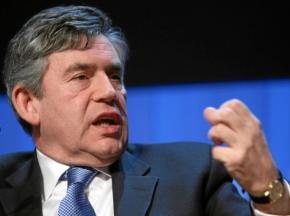Why does America hold Britain’s leash?
British foreign policy depends largely on U.S. foreign policy for strategic reasons, writes the Irish socialist .
JEREMY PAXMAN wondered "Why are we in Afghanistan?" on Newsnight on Monday. The answer is, "Yo, Blair!"
Why have Britain's nuclear weapons been excluded from the review of defense funding announced last week? Again, "Yo, Blair!"
Brown's refusal in January to call for an end to the Israeli assault on Gaza? "Yo, Blair!"
And so on.
"Yo, Blair!" was folksy slogan with which George Bush signaled the nature of the U.S./UK relationship at the Group of Eight (G8) meeting in St. Petersburg in July 2006.
It will be recalled that Bush continued to munch a bap (or bread roll, as they are apparently known in G8 circles) while Blair stood behind him, feet shuffling, hands clasped, manic grin glazed to his face, offering to travel, "if you'd like," to the Middle East to "prepare the ground" for a possible diplomatic offensive by Condoleezza Rice intended to isolate Hezbollah.
If he failed, no matter. He'd take the hit. "Condie," on the other hand, couldn't afford to be seen to fail. Thus, the Prime Minister of Britain, pleading for a chance to act as human shield protecting a U.S. Secretary of State from political flak.

"Has any British Prime Minister ever compromised his position in such a supine way?" asked the Daily Mail, reasonably.
Bush took a rain check on Blair's bid for the position of political mudguard and, without further ado, gave Israel the green light to storm into Lebanon to crush Hezbollah. Instead, Hezbollah gave the Israelis a hammering.
This wasn't the first, nor was it to be the last, "Yo Blair!" moment.
A Guardian/ICM poll published on Tuesday suggested that a majority of the British people, far from wanting $33 billion spent on updating the Trident nuclear system, would rather see the country's nuclear arsenal scrapped. But how come Britain has and wants to keep (that is, the government wants to keep) nuclear arms anyway?
It has never had much to do with deterrence, always a lot to do with keeping onside and abreast of the U.S. Attlee's foreign secretary, Ernest Bevin, returned from an official visit to the U.S. in 1946 convinced that he'd been treated with less respect than he deserved on account of Britain's lack of a Hiroshima-type device: "I don't want any other Foreign Secretary...to be talked at as I have just had in my discussions with Mr. Byrnes. We have got to have this thing over here, whatever it costs. We've got to have the bloody Union Jack flying on top of it."
Thus, the decision that Britain should become a nuclear power. But the bloody Union Jack atop the Bomb didn't give Britain parity.
SUEZ IN 1956 saw the last spasm of foreign policy independence from the UK. The Eden government had convinced itself that a decisive strike against Egypt in retaliation for Nasser's nationalization of the canal would reassert Britain's position as a global power in its own right. The Americans, he had complained, "want to run the world...want to replace us in Egypt."
So the British, with the French and the Israelis, hatched a cunning plan. Israel, unprovoked, would attack Egypt. The Egyptians, naturally, would hit back. Britain and France would invade to keep the peace, with a view to keeping the canal. The cunning plan was put into operation.
Upon hearing of this cheek, U.S. President Eisenhower ordered the British and French out, and forced Israel to hand back the Sinai Peninsula.
The French responded to the humiliation by closing U.S. bases and developing an independent nuclear capacity, the British by accepting their reduced status and opting for the purchase of Polaris from the U.S. rather than pursuing the dream of an independent British bomb.
The British Government, as historian John Newsinger put it:
had reluctantly come to realize that while Britain still had global interests, the British state no longer had the power to protect them. Only the U.S. had the necessary economic and military resources. Consequently, the keystone of British foreign policy became its alliance with the United States.
"Yo, Blair!"
Four years ago, the former British ambassador in Washington, Sir Christopher Meyer, in his memoir DC Confidential, described the obeisance of New Labour ministers towards their U.S. counterparts in cringe-making detail. Jack Straw "intimidated and tongue-tied" among the powerbrokers along the Potomac, John Prescott holding forth to State Department officials on the situation in "the Balklands," Blair "seduced by the proximity and glamour of American power."
Meyer was denounced for revealing tittle-tattle which would better have been kept secret. What he'd more importantly revealed was the key to understanding why British soldiers were sent to kill and die in Iraq, and continue to be sent to kill and die in Afghanistan.
Blair acknowledged the fact of the matter in July 2002 after Straw had expressed reservations about the given rationale for the planned invasion of Iraq.
Blair's response was not to argue that Straw's concerns were baseless, but to remind his foreign secretary that a refusal to join in an invasion led by the U.S. "would be the biggest shift in foreign policy for 50 years."
Quite correct.
There's the reason Brown's government is allowing Britain to be drawn ever deeper into the bloody and futile Afghan imbroglio.
Which, Jeremy, is why the answer to your question is, "Yo, Blair!"
First published in the Belfast Telegraph.


